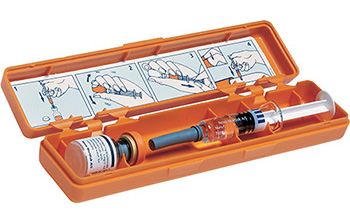Novo Nordisk is permanently discontinuing the manufacture and distribution of GlucaGen® HypoKit® in the U.S. on July 1, 2024.
This is due to an ongoing global shortfall of pre-filled syringes from an external vendor. In the U.S. market, alternative hypoglycemia rescue medications are available and therefore Novo Nordisk has made the decision to prioritize supply of GlucaGen® HypoKit® in markets around the world that have no alternative treatment options.
Our top priority is always the health and safety of the patients that use our products. We made this decision after careful consideration given that patients will be able to access alternative treatments in the US.
In advance of this upcoming discontinuation, we recommend that you proactively talk to your healthcare provider about alternative treatment options to ensure continuity of care.
Should you have any additional questions, please reach out to the Novo Nordisk Customer Care Center at (800) 727-6500.
Text: double click to edit.
Be prepared for very low blood sugar
GlucaGen® is a prescription medicine used to treat very low blood sugar (severe hypoglycemia) in people with diabetes and as a diagnostic aid during certain radiologic tests to temporarily stop stomach movement in adults.
GlucaGen® contains an injection of glucagon, and works by triggering the liver to release stored sugar, raising blood sugar levels. It is injected under the skin, similar to how insulin is injected. Do not use GlucaGen® if you have a tumor in the gland on top of your kidneys (adrenal gland) called a pheochromocytoma, you have a tumor in your pancreas called an insulinoma, you are allergic to glucagon or any of the ingredients in GlucaGen®, or you have a tumor in your pancreas called a glucagonoma because it could cause low blood sugar when used for your radiology tests.
Your health care provider might prescribe GlucaGen® HypoKit® for the following reasons:
- Works fast - GlucaGen® HypoKit® begins to raise blood sugar levels within about 10 minutes after an injection
- Goes with you - No refrigeration needed, so you can keep GlucaGen® HypoKit® handya
- Protective, bright orange case - Designed to be easier to find
- Picture instructions - The instructions on the protective case show family and friends how to give an injection if you suffer a severe hypoglycemic episode
aGlucaGen® may be stored up to 24 months at controlled room temperature 68° to 77° prior to reconstitution. Do not freeze. Keep in original package to protect from light.
Speak with your health care provider or your diabetes care team about how GlucaGen® HypoKit® can help in the event of a severe hypoglycemic episode.
- Show family, friends, coworkers, and teachers how to use the kit - just in case.
- It may be a good idea to ask your doctor for two prescriptions, so you have one GlucaGen® HypoKit® at work and one at home.
- Check the expiration date. Do not use expired glucagon.
Remember, if you are having a severe hypoglycemic episode, you will not be able to treat yourself. You will need help from others around you. Make sure your family, friends, and coworkers know where to find and how to use the GlucaGen® HypoKit®.
GlucaGen® is glucagon.


